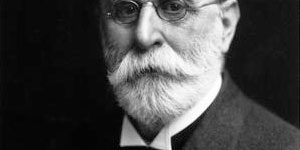
Warfield on the Trinity (part 1/4)
By Fred Zaspel–
“God Our Father and the Lord Jesus Christ”:
B.B. Warfield on Some Often-Overlooked Evidence of Early Trinitarianism
In Warfield’s day it had become popular in some circles of professing Christianity to claim that the theological distinctives of the Christian faith stemmed from the later influence of Greek philosophical thought. As Christianity grew in the Greek world, it was said, it took on philosophical baggage that was not original to the religion of Jesus and even the apostles. Of course high on the list of supposed examples of this was the doctrine of the Trinity.
In answer to all this B.B. Warfield (1851-1921) loved to demonstrate from all available evidence that the traditional, historic faith of the Christian church was indeed the faith of the aboriginal church. And within this approach, one method he seemed particularly to enjoy was showing compelling evidence of a “presupposed” Trinitarianism in the language of the early church. That is, he would expose the shared Trinitarian convictions of the earliest Christians as reflected in statements that were not intended to teach Trinitarian theology, per se, but which plainly reflected that understanding nonetheless.
One of the most striking examples of this is found in his detailed analysis of the phrase, “God our Father and the Lord Jesus Christ” (and its slight variations) as it appears in Paul’s epistles (1 Thess 1:1; 2 Thess 1:1-2; Gal 1:1, 3; 1 Cor 1:3; 2 Cor 1:2; Rom 1:7; Eph 1:2; 6:23; Col 1:2; Phlm 1:3; Phil 1:2; 1 Tim 1:2; Titus 1:4; and 2 Tim 1:2; see Warfield’s Works 2:213-31).
Warfield notes first that this phrase, so commonly employed by the apostle, appears to be one already in long use among Christians generally. “All the articles have been rubbed off, and with them all other accessories; and it stands out in its baldest elements as just ‘God Father and Lord Jesus Christ.’”
This mode of speaking of God evidently can as easily be reversed, as in Gal 1:1, where Paul describes the divine origin of his apostleship as “through Jesus Christ and God the Father.” What is striking here is that God is referred to as “Jesus Christ and God the Father,” and for Warfield the Trinitarian overtones are unmistakable.
Similarly, in each occurrence of this phrase, the apostle is invoking divine blessing. He is praying that “grace, mercy, and peace” will be given “from God our Father and Lord Jesus Christ.” Again, the divine source of blessing is spoken of in terms of both Christ and the Father. His prayer is not merely that the grace of God will come channeled through Jesus Christ. His prayer is that this grace will come from God our Father and the Lord Jesus Christ together, “as the conjoint object addressed in his petition.” The God of blessing is freely spoken of in terms of a plurality. Two persons are brought together in closest possible relation, yet they are not absolutely identified. They both are God, yet they are distinct persons. “The two, God our Father and the Lord Jesus Christ, are steadily recognized as two, and are statedly spoken of by the distinguishing designations of ‘God’ and ‘Lord.’ But they are equally steadily envisaged as one, and are stately combined as the common source of every spiritual blessing.” Accordingly, the two persons are united under the single governing preposition, “from” — “Grace to you and peace from God our Father and the Lord Jesus Christ.”
Further, this God spoken of in plural terms is yet spoken of in singular terms also. Warfield cites four passages (1 Thess 3:11; 5:23; 2 Thess 2:16; 3:16) in which the pronoun “himself” (autos) is employed and determines that “the autos is to be construed with the whole subject”—“God” and “Lord.” Both the plurality and the unity are maintained as God is referred to as “our Lord Jesus Christ and God our Father Himself.”
All this is to say, simply, that God the Father and the Lord Jesus Christ are essentially one yet personally distinct, and, thus, that Trinitarianism is embedded in the very language of the earliest of Christian slogans. It is not formally taught in the pages of the New Testament as much as it is presupposed everywhere. It was the very natural and universal mode of reference to Him, and the language reflects a doctrine that was common property to Christians everywhere, a firmly established understanding of the being of God.
Warfield’s article is highly rewarding reading, and I commend it highly for every student of the New Testament and of Christian theology.
(For more on this see The Theology of B.B. Warfield: A Systematic Summary)
Fred Zaspel holds a Ph.D. in historical theology from the Free University of Amsterdam. He is currently a pastor at the Reformed Baptist Church of Franconia, PA. He is also the interim Senior Pastor at New Hyde Park Baptist Church on New York’s Long Island, and Adjunct Professor of Systematic Theology at Calvary Baptist Seminary in Lansdale, PA. He is also the author of The Continuing Relevance of Divine Law (1991); The Theology of Fulfillment (1994); Jews, Gentiles, & the Goal of Redemptive History (1996); New Covenant Theology with Tom Wells (New Covenant Media); The Theology of B.B. Warfield: A Systematic Summary (Crossway, 2010). Fred is married to Kimberly and they have two grown children, Gina and Jim.

